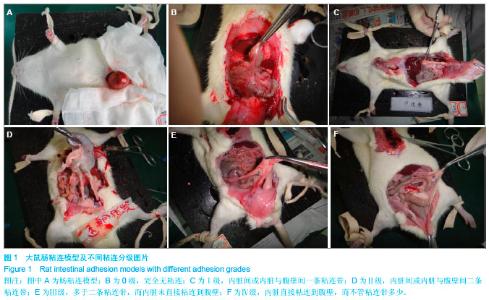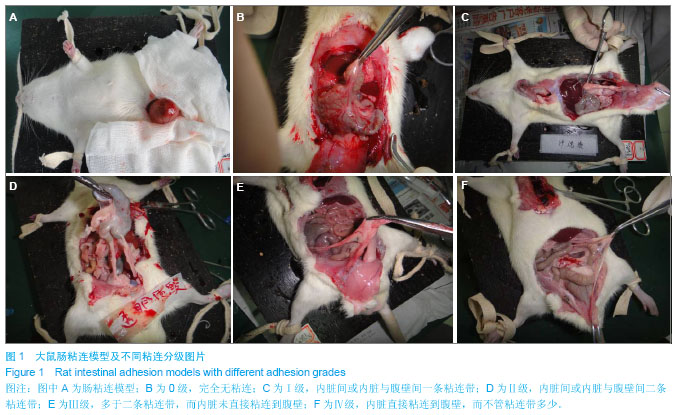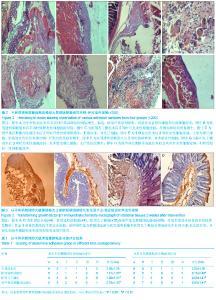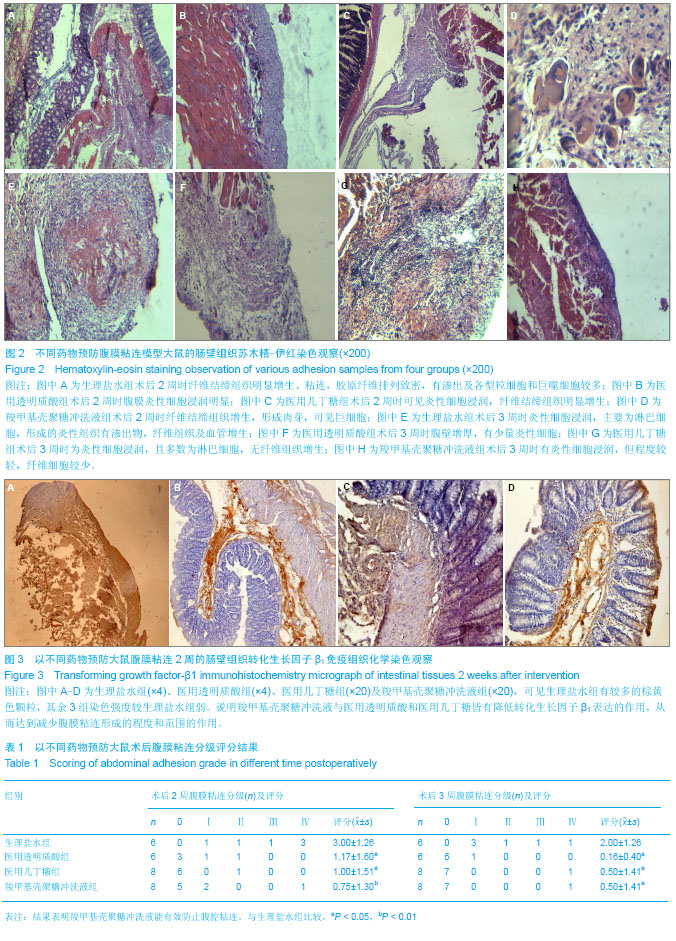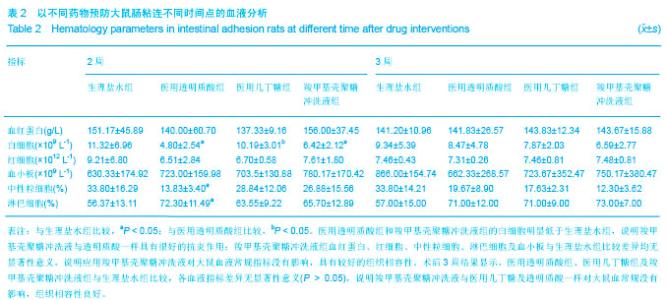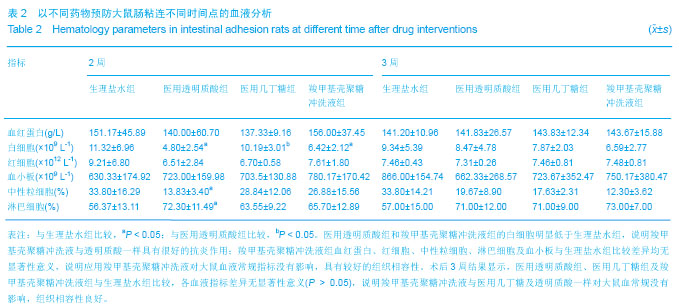| [1] Yang B,Gong CY,Zhao X,et al.Preventing postoperative abdominal adhesions in a rat model with PEG-PCL-PEG hydrogel.Int J Nanomedicine.2012;7:547-557. [2] Kutlay J,Ozer Y,Isik B,et al.Comparative effectiveness of several agents for preventing postoperative adhesions.World J Surg.2004;28(7):662-665.[3] Mulier KE,Nguyen AH,Delaney JP,et al.Comparison of Permacol™ and Strattice™ for the repair of abdominal wall defects.Hernia.2011;15(3):315-319. [4] Sahin M,Cakir M,Avsar FM,et al.The effects of anti-adhesion materials in preventing postoperative adhesion in abdominal cavity(anti-adhesion materials for postoperative adhesions). Inflamm.2007;30(6):244-249. [5] Wei CZ,Hou CL,Gu QS,et al.A thermosensitive chitosan-based hydrogel barrier for postoperative adhesions’ prevention. Biomaterials.2009;30(29):5534-5540. [6] Na NH,Kim IK,Han JH,et al.Synthesis of O-carboxylated low molecular chitosan with azido phenyl group: its application for adhesion prevention.Macromol Res.2010;18(10): 1001-1007.[7] Lauder CI,Garcea G,Strickland A,et al.Use of a modified chitosan-dextran gel to prevent peritoneal adhesions in rat model.J Surg Res.2011;171(2):877-882. [8] Muzzarelli RAA,Muzzarelli C.Chitosan chemistry: relevance to the biomedical sciences.Adv Polym Sci.2005;186:151-209.[9] Francesko A,Tzanov T.Chitin, chitosan and derivatives for wound healing and tissue engineering.Adv Biochem Engin Biotechnol.2011; 125:1-27.[10] Park SH,Seo SY,Na HN,et al.Preparation of a visible light-reactive low molecular-o-carboxymethyl chitosan (LM-O-CMCS)derivative and applicability as an anti-adhesion agent.Macromol Res.2011;19(9):921-927. [11] 肖海军,侯春林,薛峰.羧甲基壳聚糖-羧甲基纤维素防粘连膜的制备及其理化特性[J].中国组织工程研究与临床康复,2010, 14(38): 7069-7074. [12] Jiang LY,Li YB,Xiong CD.A novel composite membrane of chitosan-carboxymethyl cellulose polyelectrolyte complex membrane filled with nano-hydroxyapatite I Preparation and properties. J Mater Sci Mater Med.2009;20(8):1645-1652. [13] 张紫平,周光文,吴慧萍,等.羧甲基壳聚糖粉防大鼠腹腔粘连的实验研究[J].医学临床研究,2010,27(6):101-104. [14] Harris ES,Morgan RF,Rodeheaver GC.Analysis of the kinetics of peritoneal adhesion formation in the rat and evaluation of potential antiadhesive agents.Surgery.1995; 117(6):663-669. [15] Nair SK,Bhat IK,Aurora AL.Role of proteolytic enzyme in the prevention of postoperative intraperitoneal adhesions.Arch Surg.1974;108:849-853. [16] Belluco C, Meggiolaro F, Pressato D,et al.Prevention of postsurgical adhesions with an autocross linked hyaluronan derivative gel.J Surg Res.2001;100(2):217-221. [17] Di Filippo C,Petronella P, Freda F,et al.Involvement of the ubiquitin-proteasomesystem in the formation of experimental postsurgical peritoneal adhesions.Mediat Inflamm.2012;19(4): 723-726. [18] Zhou J,Liwski RS,Elson C,et al.Reduction in postsurgical adhesion formation after cardiac surgery in a rabbit model using N,O-carboxymethyl chitosan to block cell adherence. J Thorac Cardiovasc Surg.2008;135(4): 777-783. [19] Schneider A,Bennek J,Olsen KO,et al.Experimental study evaluating the effect of a barrier method on postoperative intraabdominal adhesions.Diges Dis Sci.2006;51(3): 566-570. [20] Yang Z,Han B,Fu D,et al.Acute toxicity of high dosage carboxymethyl chitosan and its effect on the blood parameters in rats.J Mater Sci Mater Med.2012;23(2): 457-462. [21] 洪欣,沈柏用,韩宝三.羧甲基壳聚糖防粘连粉雾剂的应用及作用机制的研究[J].外科理论与实践,2009,14 (4):426-429. [22] 周贵,奚延斐,郑裕东,等.三种羧甲基壳聚糖防粘连膜的降解及其生物相容性[J].中国组织工程研究与临床康复,2009,13(8): 1411-1418. [23] 沈新,李孟彬,王为忠,等.壳聚糖和尿囊素预防外科术后腹腔粘连效果的观察[J].第四军医大学学报,2006,27(12): 1104- 1107. [24] 胡莎,李亚,孟维杰,等.妇康口服液对大鼠实验性宫腔粘连预防效果及对宫内膜组织TGF-β1, PAI-1和MMP-9表达影响的试验研究[J].四川大学学报:医学版,2013,44(4):540-544.[25] 潘仕荣,莫家聪,郑欢玲,等.O-羧甲基壳聚糖溶液预防腹膜术后粘连的试验研究[J].生物医学工程学杂志,2009,26(2): 347-350. [26] 王勇,陈道达,田元,等.腹腔粘连大鼠血清、腹腔灌洗液中IL-6、IL-8及TNF-a的变化[J].华中科技大学学报:医学版,2003,32(2): 194-196. |
